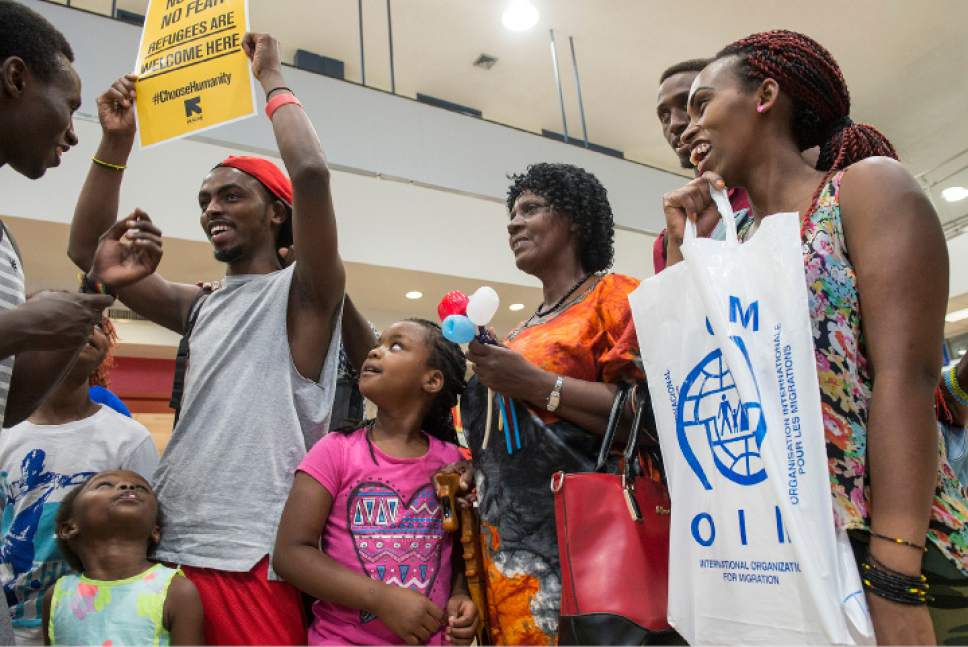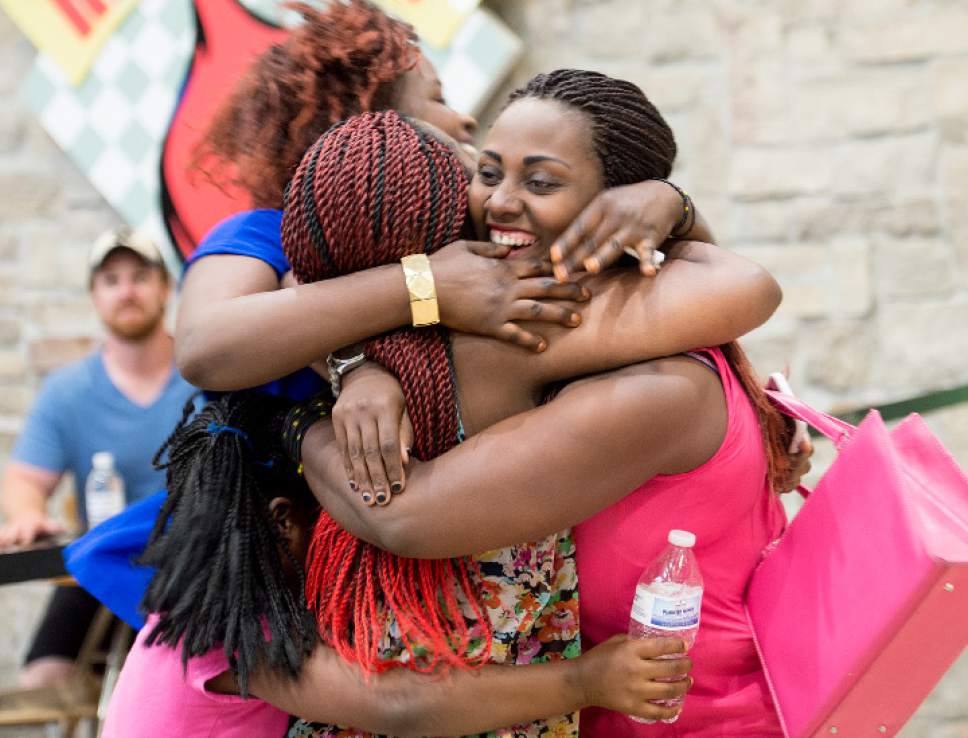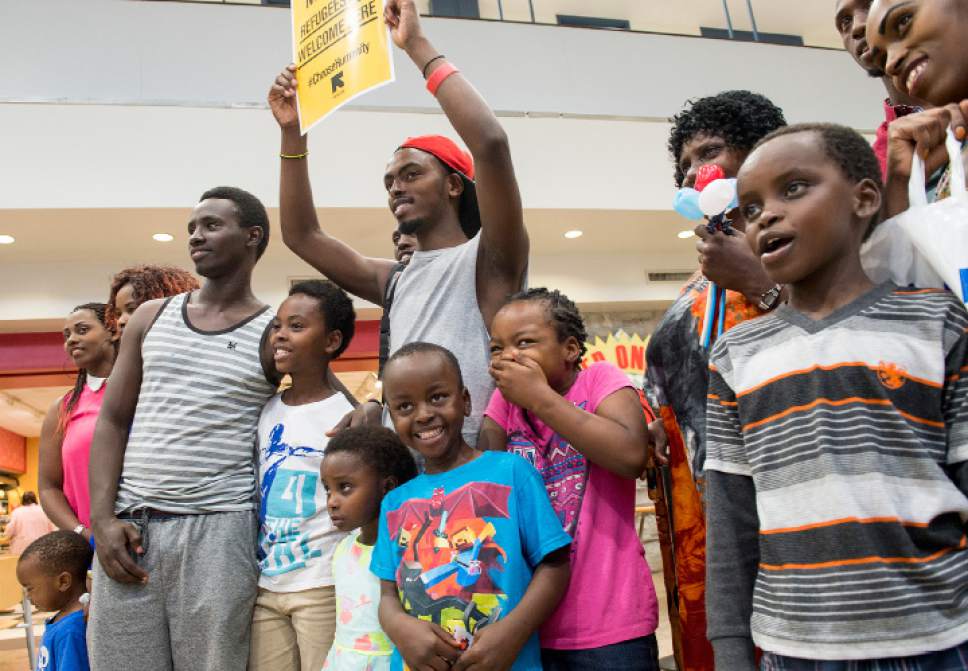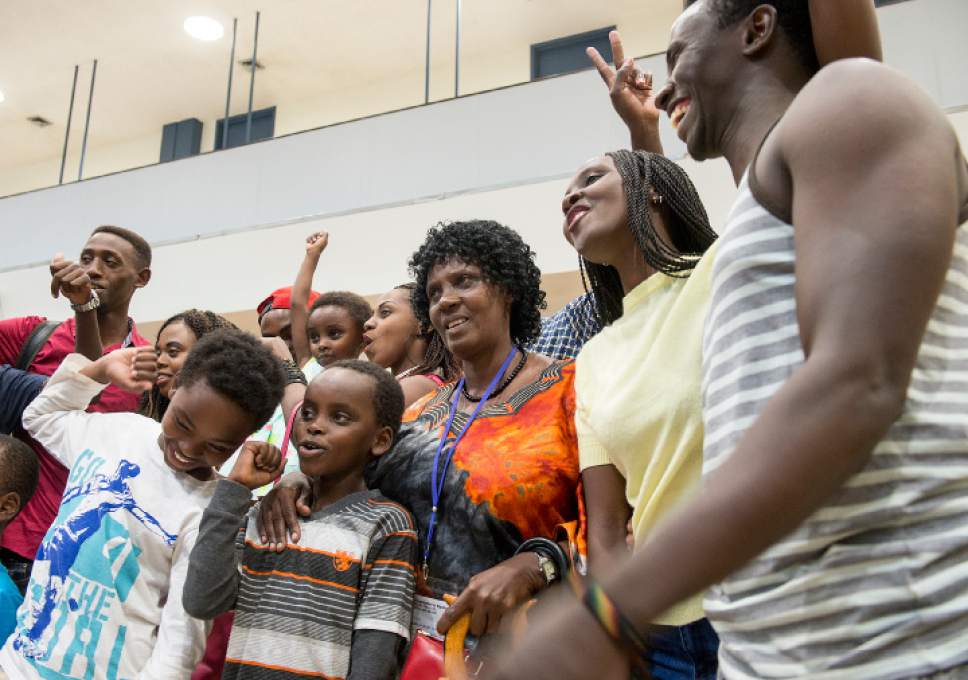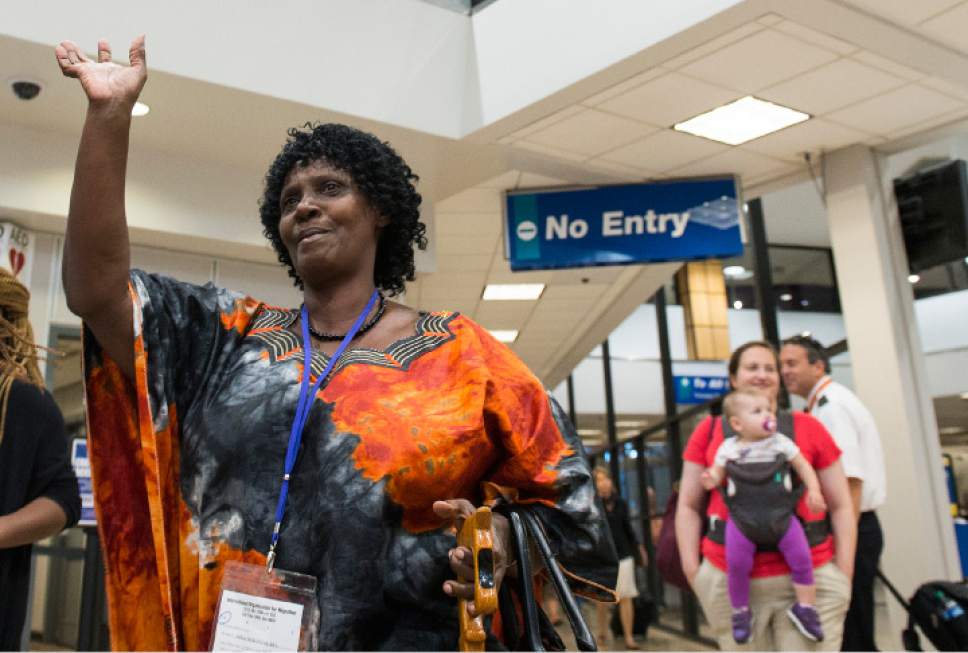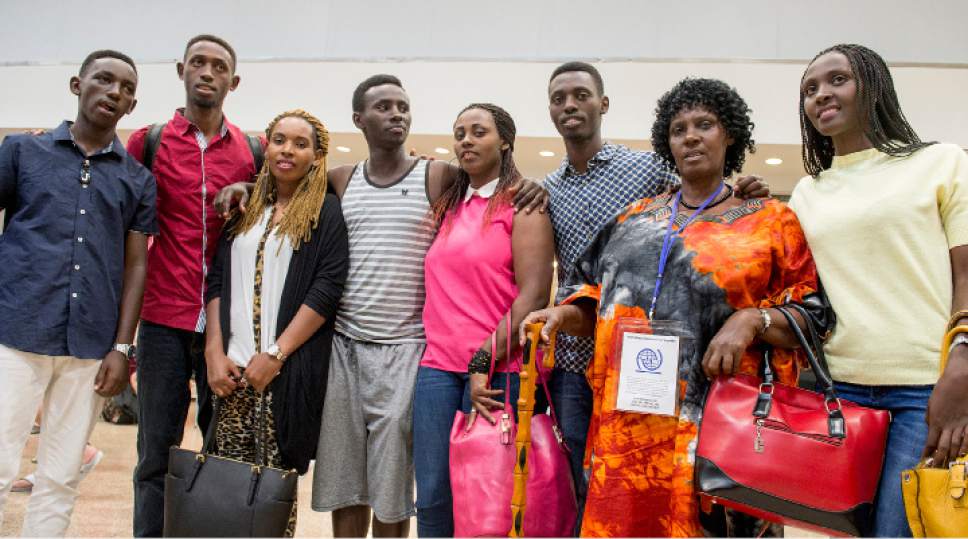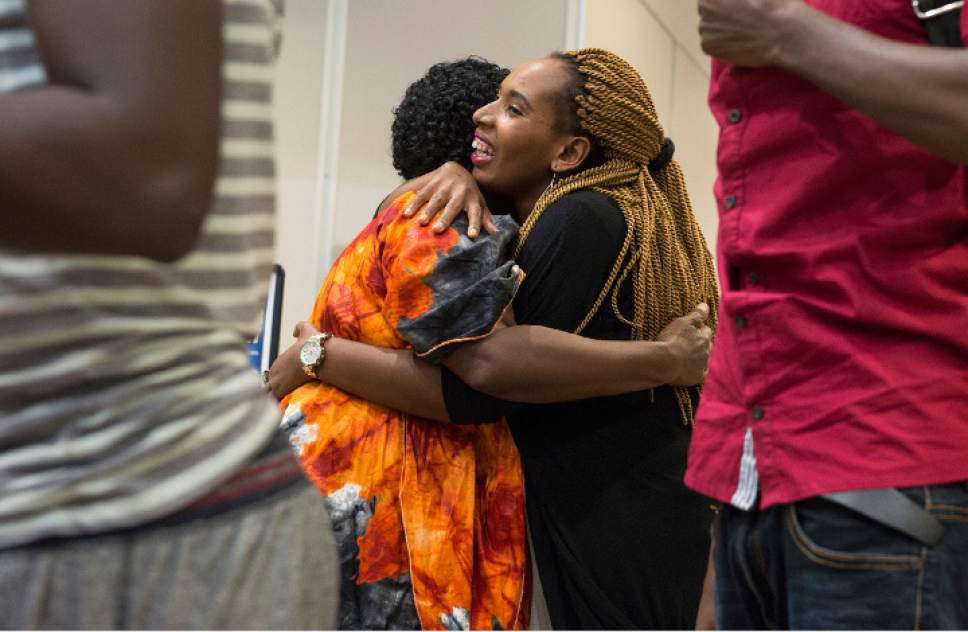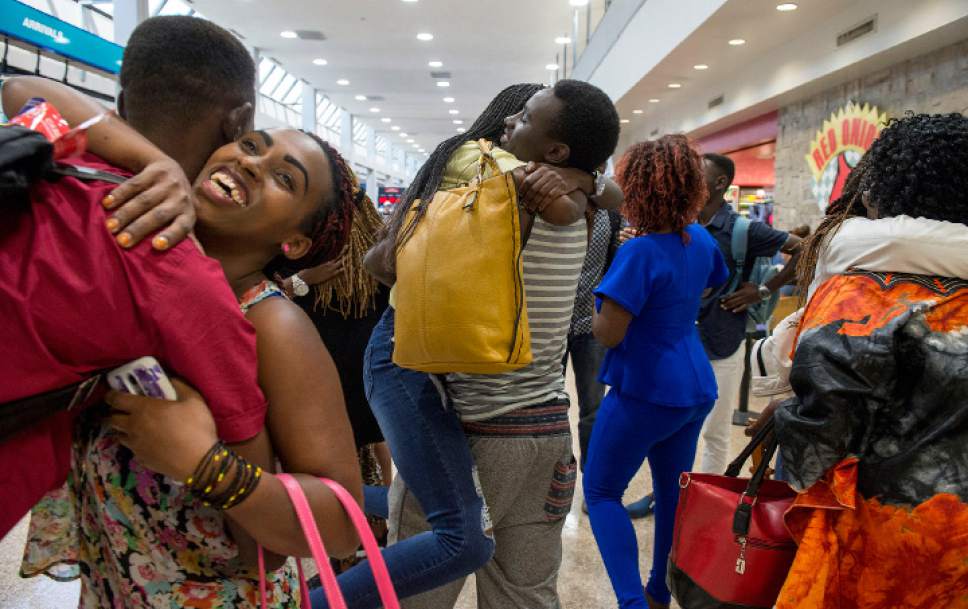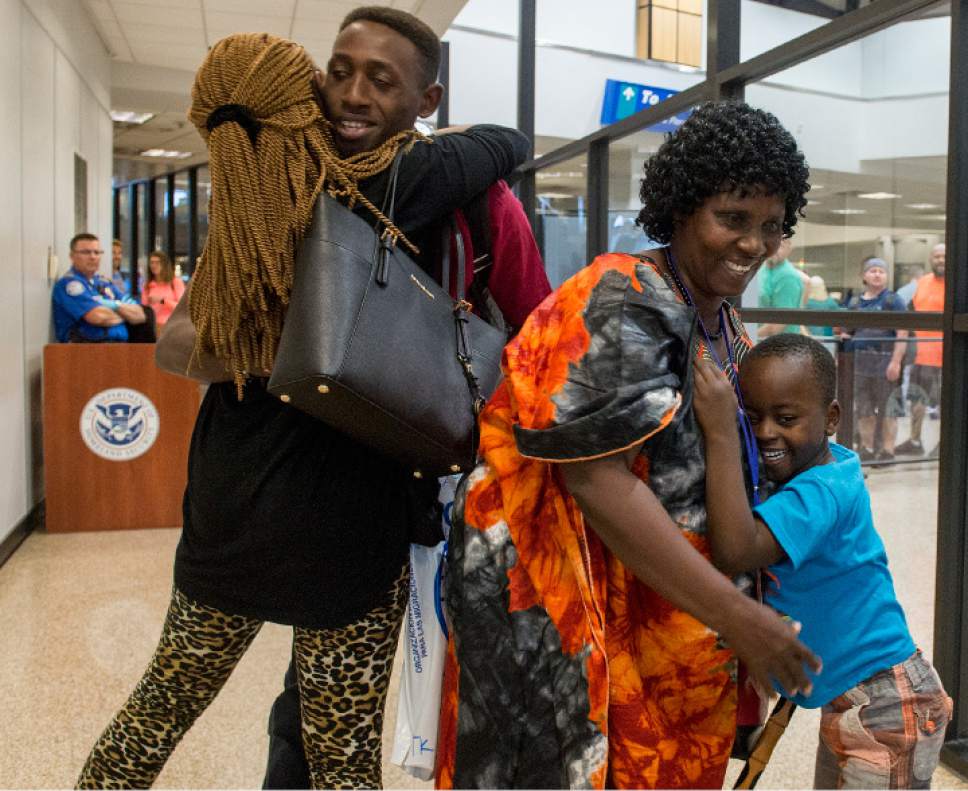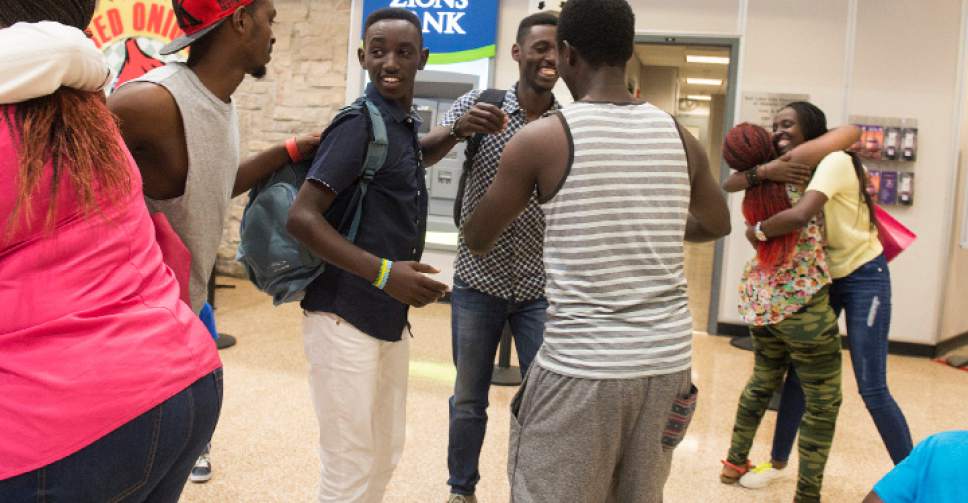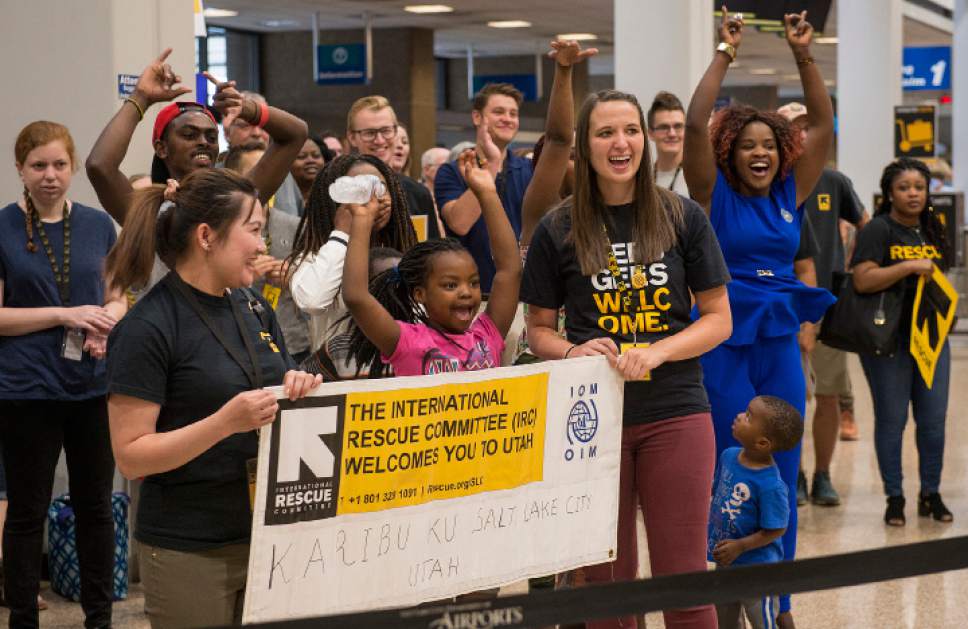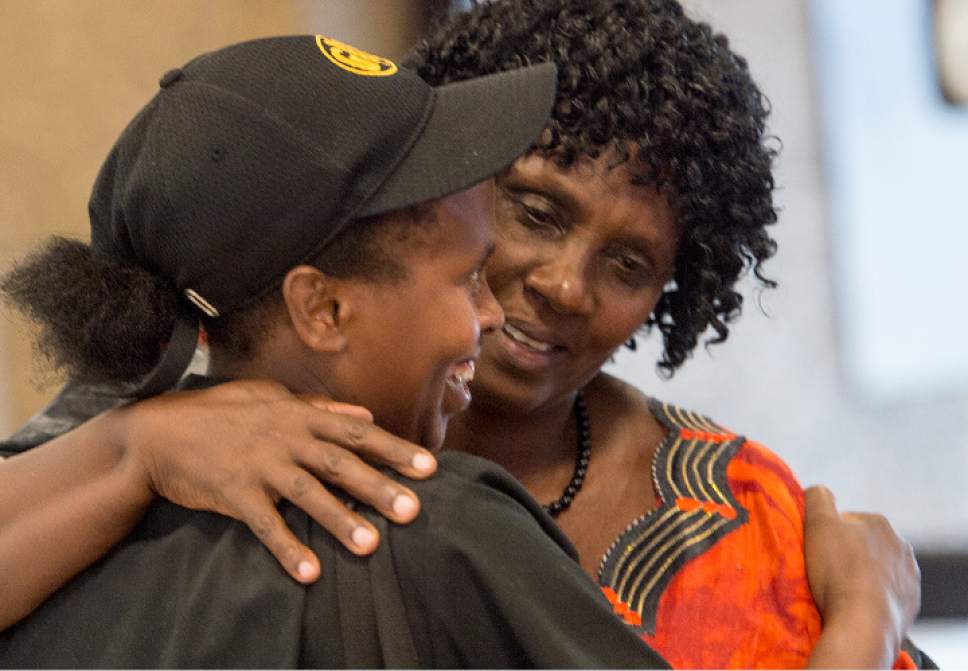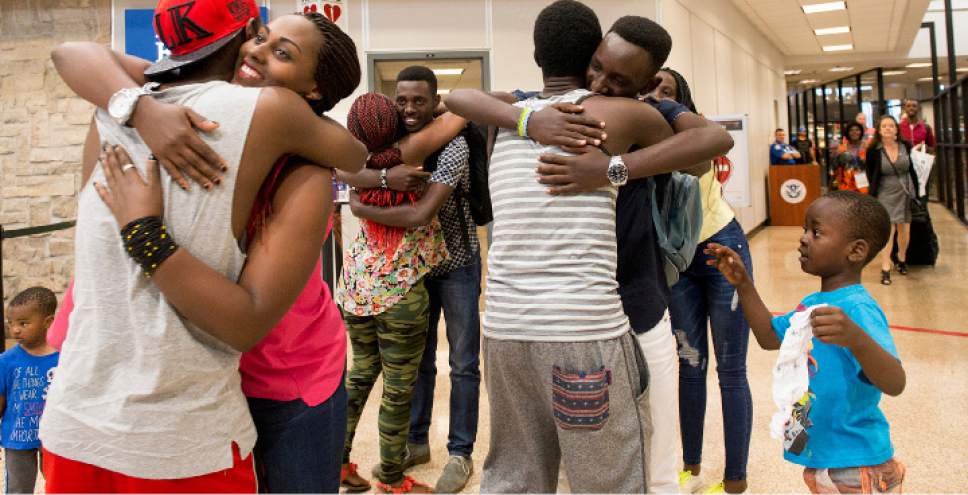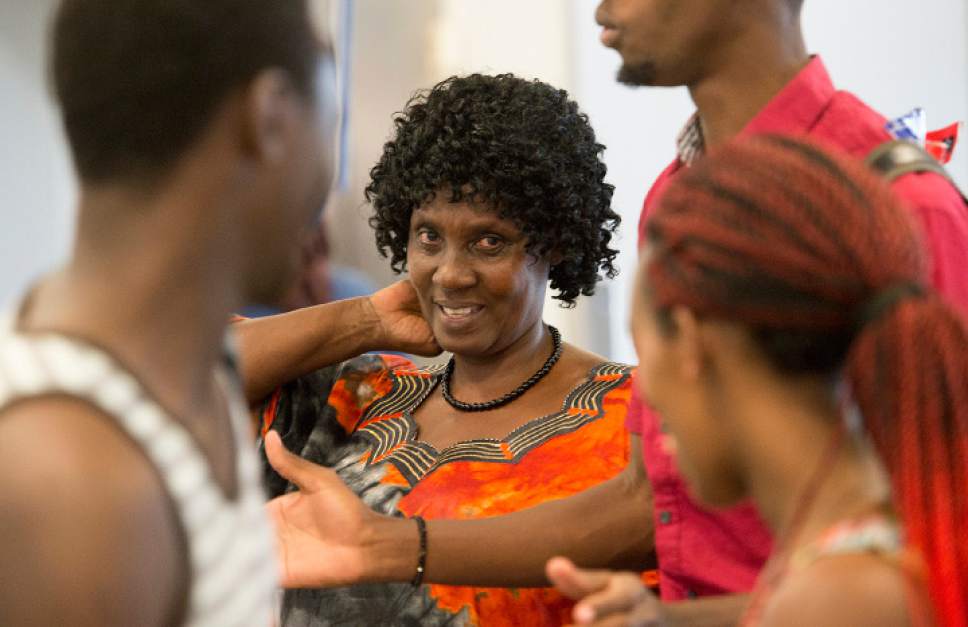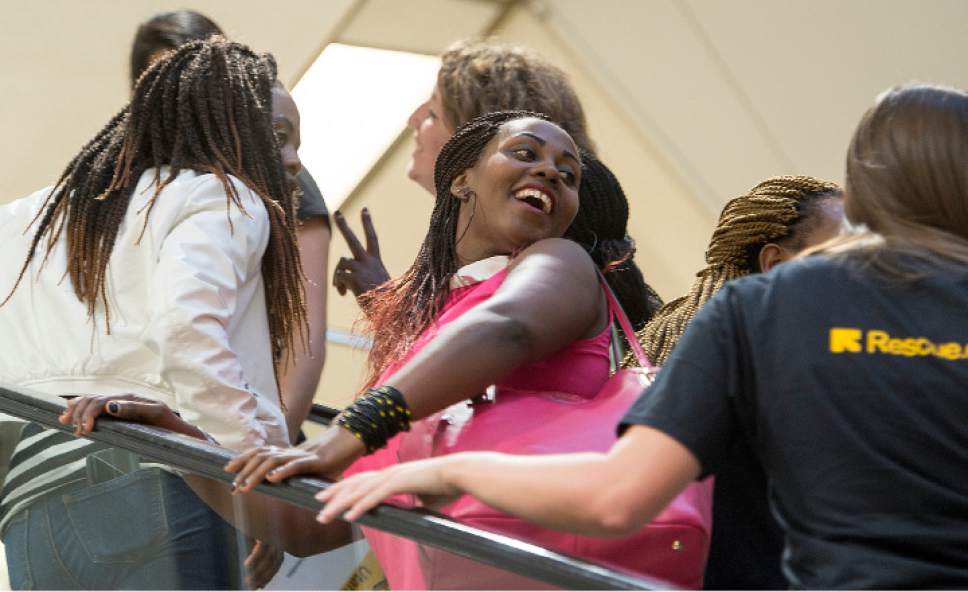Leah Hogsten | The Salt Lake Tribune
Jullien Mukantagara, (center, in orange) smiles as fellow family friend Patient Gatabazi (
Leah Hogsten | The Salt Lake Tribune
Adeline Uwicyeza is greeted by fellow family and friends moments after her arrival to Sal
Leah Hogsten | The Salt Lake Tribune
l-r Gustav Nyangabo poses with his friend Patient Gatabazi holding a welcoming sign for the
Leah Hogsten | The Salt Lake Tribune
Jullien Mukantagara, (center, in orange), daughter Evelyne Gaju, and son Gustav Nyangabo br
Leah Hogsten | The Salt Lake Tribune
Jullien Mukantagara, (center, in orange) smiles as friends and family from the Democratic
Leah Hogsten | The Salt Lake Tribune
l-r Kayiranga Jules, Patrick Byusa, Aimee Ingabire, Gustav Nyangabo, Adeline Uwicyeza, Ma
Leah Hogsten | The Salt Lake Tribune
Aimee Ingabire, right, hugs her mother Jullien Mukantagara, moments after her arrival in
Leah Hogsten | The Salt Lake Tribune
Gustav Nyangabo hugs his sister Evelyne Gaju (center) moments after the arrival of Gaju and
Leah Hogsten | The Salt Lake Tribune
l-r Aimee Ingabire hugs her brother Patrick Byusa moments after his arrival to Salt Lake
Leah Hogsten | The Salt Lake Tribune
The Salt Lake City office of the International Rescue Committee welcomed the last refugee
Leah Hogsten | The Salt Lake Tribune
The Salt Lake City office of the International Rescue Committee welcomes the last refugee
Leah Hogsten | The Salt Lake Tribune
Jullien Mukantagara, (center, in orange) smiles as friends and family from the Democratic
Leah Hogsten | The Salt Lake Tribune
l-r Adeline Uwicyeza and her brothers Makuza Innocent, center, and Kayrianga Jules, right,
Leah Hogsten | The Salt Lake Tribune
Jullien Mukantagara, (center, in orange) smiles as friends and family from the Democratic R
Leah Hogsten | The Salt Lake Tribune
Adeline Uwicyeza is all smiles after her arrival to Salt Lake City with her mother and fou
Leah Hogsten | The Salt Lake Tribune
Jullien Mukantagara, (center, in orange) smiles as fellow family friend Patient Gatabazi (left) holds a welcoming sign for Mukantagara and her children from the Democratic Republic of Congo, moments after their arrival in Utah where the entire family was reunited. The Salt Lake City office of the International Rescue Committee welcomed the last refugee family to Utah, July 6, 2017, before President Donald Trump's 120-day ban on refugees goes into effect.
Leah Hogsten | The Salt Lake Tribune
Adeline Uwicyeza is greeted by fellow family and friends moments after her arrival to Salt Lake City with her mother and four other siblings from the Democratic Republic of Congo. The Salt Lake City office of the International Rescue Committee welcomed the last refugee family to Utah on Thursday, July 6, 2017, before President Donald Trump's 120-day ban on refugees goes into effect.
Leah Hogsten | The Salt Lake Tribune
l-r Gustav Nyangabo poses with his friend Patient Gatabazi holding a welcoming sign for the arrival of Nygangabo's mother and siblings from the Democratic Republic of Congo, moments after their arrival in Utah where the entire family was reunited. The Salt Lake City office of the International Rescue Committee welcomed the last refugee family to Utah, July 6, 2017, before President Donald Trump's 120-day ban on refugees goes into effect.
Leah Hogsten | The Salt Lake Tribune
Jullien Mukantagara, (center, in orange), daughter Evelyne Gaju, and son Gustav Nyangabo break into laughter as fellow friends and family from the Democratic Republic of Congo and members of the International Rescue Committee cheer after the family was reunited at Salt Lake International Airport. The Salt Lake City office of the International Rescue Committee welcomed the last refugee family to Utah on Thursday, July 6, 2017, before President Donald Trump's 120-day ban on refugees goes into effect.
Leah Hogsten | The Salt Lake Tribune
Jullien Mukantagara, (center, in orange) smiles as friends and family from the Democratic Republic of Congo and members of the International Rescue Committee cheer her arrival in Utah, where she was reunited with all of her children at the Salt Lake International Airport. The Salt Lake City office of the International Rescue Committee welcomed the last refugee family to Utah on Thursday, July 6, 2017, before President Donald Trump's 120-day ban on refugees goes into effect.
Leah Hogsten | The Salt Lake Tribune
l-r Kayiranga Jules, Patrick Byusa, Aimee Ingabire, Gustav Nyangabo, Adeline Uwicyeza, Makuza Innocent, Jullien Mukantagara and Evelyne Gaju, a family from the Democratic Republic of Congo, were reunited at the Salt Lake International Airport. The Salt Lake City office of the International Rescue Committee welcomed the last refugee family to Utah on Thursday, July 6, 2017, before President Donald Trump's 120-day ban on refugees goes into effect.
Leah Hogsten | The Salt Lake Tribune
Aimee Ingabire, right, hugs her mother Jullien Mukantagara, moments after her arrival in Salt Lake City from the Democratic Republic of Congo where Mukantagara was reunited with all of her children. The Salt Lake City office of the International Rescue Committee welcomed the last refugee family to Utah on Thursday, July 6, 2017, before President Donald Trump's 120-day ban on refugees goes into effect.
Leah Hogsten | The Salt Lake Tribune
Gustav Nyangabo hugs his sister Evelyne Gaju (center) moments after the arrival of Gaju and Nyangabo's mother and four other siblings from the Democratic Republic of Congo. The Salt Lake City office of the International Rescue Committee welcomed the last refugee family to Utah on Thursday, July 6, 2017, before President Donald Trump's 120-day ban on refugees goes into effect.
Leah Hogsten | The Salt Lake Tribune
l-r Aimee Ingabire hugs her brother Patrick Byusa moments after his arrival to Salt Lake City with his mother Jullien Mukantagara (right, hugging an unidentified child) and four other siblings from the Democratic Republic of Congo. The Salt Lake City office of the International Rescue Committee welcomed the last refugee family to Utah on Thursday, July 6, 2017, before President Donald Trump's 120-day ban on refugees goes into effect.
Leah Hogsten | The Salt Lake Tribune
The Salt Lake City office of the International Rescue Committee welcomed the last refugee family to Utah on Thursday, July 6, 2017, before President Donald Trump's 120-day ban on refugees goes into effect.
Leah Hogsten | The Salt Lake Tribune
The Salt Lake City office of the International Rescue Committee welcomes the last refugee family to Utah on Thursday, July 6, 2017, before President Donald Trump's 120-day ban on refugees goes into effect.
Leah Hogsten | The Salt Lake Tribune
Jullien Mukantagara, (center, in orange) smiles as friends and family from the Democratic Republic of Congo and members of the International Rescue Committee cheer her arrival in Utah, where she was reunited with all of her children at the Salt Lake International Airport. The Salt Lake City office of the International Rescue Committee welcomed the last refugee family to Utah on Thursday, July 6, 2017, before President Donald Trump's 120-day ban on refugees goes into effect.
Leah Hogsten | The Salt Lake Tribune
l-r Adeline Uwicyeza and her brothers Makuza Innocent, center, and Kayrianga Jules, right, are all smiles receiving hugs after their arrival to Salt Lake City with her mother and two other siblings (pictured walking through security at right) from the Democratic Republic of Congo. The Salt Lake City office of the International Rescue Committee welcomed the last refugee family to Utah on Thursday, July 6, 2017, before President Donald Trump's 120-day ban on refugees goes into effect.
Leah Hogsten | The Salt Lake Tribune
Jullien Mukantagara, (center, in orange) smiles as friends and family from the Democratic Republic of Congo and members of the International Rescue Committee welcome her arrival in Utah, where she was reunited with all of her children at the Salt Lake International Airport. The Salt Lake City office of the International Rescue Committee welcomed the last refugee family to Utah on Thursday, July 6, 2017, before President Donald Trump's 120-day ban on refugees goes into effect.
Leah Hogsten | The Salt Lake Tribune
Adeline Uwicyeza is all smiles after her arrival to Salt Lake City with her mother and four other siblings from the Democratic Republic of Congo. The Salt Lake City office of the International Rescue Committee welcomed the last refugee family to Utah on Thursday, July 6, 2017, before President Donald Trump's 120-day ban on refugees goes into effect.


